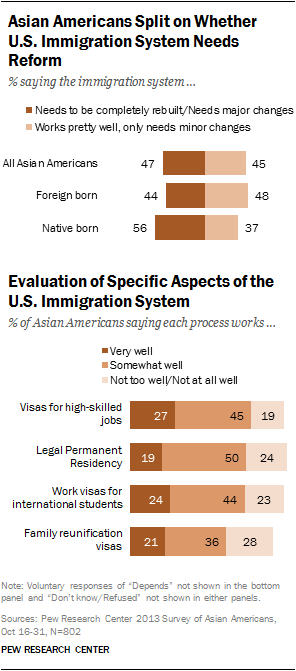
Next to Latinos, the Asian-American community is the second-largest demographic group likely to be impacted by the expected changes in the nation’s immigration policy. President Obama and Democrats in Congress are pushing for reform this year, and Republicans are expected to offer specific proposals in the coming weeks.
Asian Americans comprised five percent of the U.S. population in 2012. The largest Asian origin groups are Chinese (24%), Indian (20%) and Filipino (18%). Eight-in-ten (79%) of the nation’s 12.2 million Asian-American adults are foreign born, a share greater than that among Hispanic adults (50%). Asian Americans also make up a larger share than Hispanics of new immigrants arriving in the U.S., making the topic of immigration reform an important one to the Asian-American community.
When it comes to evaluations of how well the current U.S. immigration system is working, Asian Americans are split. 45% say the system “works pretty well and requires only minor changes” while 47% say the system “needs to be completely rebuilt” or “needs major changes,” according to a recent survey of Asian-American adults from the Pew Research Center.
Eight-in-ten Asian-American adult immigrants are either legal permanent residents or naturalized U.S. citizens. An additional 6% are in the U.S. with a work, student or other type of temporary visa. And 14% are unauthorized immigrants (this compares with Hispanic immigrant adults, 43% of whom are unauthorized immigrants).
According to the survey, seven-in-ten (69%) Asian Americans say that they or their family members have had some personal experience with the system. Fully 86% of Asian Americans say they have at least a little knowledge about the U.S. immigration system, and about a third (34%) say they know “a lot” about it.
Overall, Asian-American respondents give high marks to specific aspects of the U.S. immigration system. Some 72% say that the process for getting visas for high-skill jobs works “very well” or “somewhat well.” When it comes to getting legal permanent residency, 69% of Asian Americans say the system works “very well” or “somewhat well.”
The survey also found that about two-thirds (68%) of Asian Americans say the system works “very well” or “somewhat well” when it comes to work visas for international students who want to stay and work in the U.S. after they graduate. On family reunification visas, 57% of Asian Americans say the same about the system.
When compared with results from a simultaneous survey done among Hispanics, Asian Americans are more likely to say they are knowledgeable and have experience with the U.S. immigration system. For example, 69% of Asian Americans compared with 45% of Hispanics say they or their family members have had some personal experience with the U.S. immigration system. And 34% of Asian Americans say they know “a lot” about the system, compared with 23% of Hispanics. However, Hispanics are more likely than Asian Americans to say the U.S. immigration system “needs to be completely rebuilt” or “needs major changes”—62% of Hispanics say that, compared with 47% of Asian Americans.
(Note: The Pew Research surveys of Asian Americans and Hispanics did not have sample sizes large enough to provide more specific breakdowns by Asian origin groups.)

